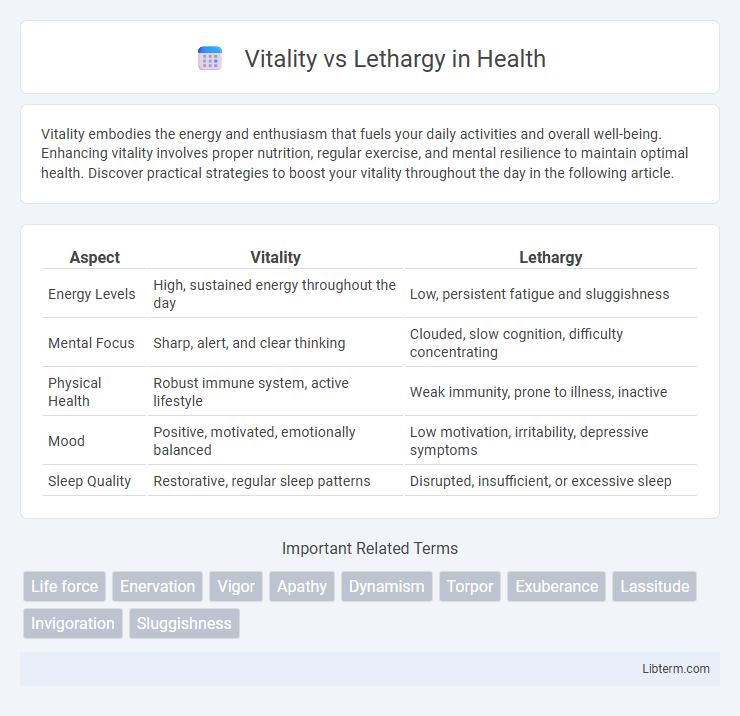Vitality embodies the energy and enthusiasm that fuels your daily activities and overall well-being. Enhancing vitality involves proper nutrition, regular exercise, and mental resilience to maintain optimal health. Discover practical strategies to boost your vitality throughout the day in the following article.
Table of Comparison
| Aspect | Vitality | Lethargy |
|---|---|---|
| Energy Levels | High, sustained energy throughout the day | Low, persistent fatigue and sluggishness |
| Mental Focus | Sharp, alert, and clear thinking | Clouded, slow cognition, difficulty concentrating |
| Physical Health | Robust immune system, active lifestyle | Weak immunity, prone to illness, inactive |
| Mood | Positive, motivated, emotionally balanced | Low motivation, irritability, depressive symptoms |
| Sleep Quality | Restorative, regular sleep patterns | Disrupted, insufficient, or excessive sleep |
Understanding Vitality: The Essence of Vibrant Living
Vitality embodies the dynamic energy and enthusiasm essential for vibrant living, marked by physical health, mental clarity, and emotional resilience. It drives motivation, creativity, and active engagement with life's challenges and opportunities. Cultivating vitality involves balanced nutrition, regular exercise, stress management, and restorative sleep, which collectively enhance overall well-being and longevity.
Defining Lethargy: Causes and Consequences
Lethargy is characterized by a profound lack of energy and motivation, often resulting from factors such as chronic illness, poor nutrition, sleep disorders, or mental health conditions like depression. This state adversely affects cognitive function, physical performance, and emotional well-being, leading to decreased productivity and impaired quality of life. Understanding the underlying causes of lethargy is crucial for effective intervention and restoring optimal vitality.
Key Differences Between Vitality and Lethargy
Vitality refers to a state of high energy, enthusiasm, and physical well-being, characterized by active engagement and mental alertness. Lethargy, in contrast, denotes a condition of sluggishness, fatigue, and low energy, often accompanied by a lack of motivation and reduced cognitive function. The key differences lie in their impact on productivity, mood, and overall health, with vitality promoting optimal functioning and lethargy leading to decreased performance and potential health issues.
Physical Health’s Role in Energy Levels
Physical health significantly influences energy levels, with regular exercise and balanced nutrition enhancing vitality by improving cardiovascular function and muscle strength. Adequate sleep and hydration further support metabolic processes that sustain alertness and reduce lethargy. Chronic conditions such as anemia or hypothyroidism can impair energy production, underscoring the importance of medical management to maintain optimal physical health and consistent energy.
Psychological Factors Affecting Vitality and Lethargy
Psychological factors such as chronic stress, depression, and anxiety significantly influence vitality and lethargy by altering neurotransmitter levels and hormonal balance, leading to decreased energy and motivation. Cognitive patterns like negative thinking and lack of purpose intensify lethargy, while optimism and goal-oriented mindsets enhance vitality by promoting resilience and engagement. Sleep quality and emotional regulation also play crucial roles in maintaining mental energy and preventing persistent fatigue.
Nutrition and Its Impact on Daily Energy
Proper nutrition directly affects daily energy levels by providing essential macronutrients and micronutrients that fuel bodily functions and sustain vitality. Balanced intake of carbohydrates, proteins, healthy fats, vitamins, and minerals supports optimal metabolic processes and reduces feelings of lethargy. Inadequate nutrition leads to energy depletion, impairing concentration, physical performance, and overall well-being.
Lifestyle Habits That Boost or Drain Vitality
Consistent exercise, balanced nutrition rich in antioxidants, and adequate sleep significantly boost vitality by enhancing energy levels and mental clarity. In contrast, sedentary behavior, poor diet high in processed foods, and chronic stress drain energy, leading to lethargy and reduced overall wellness. Incorporating mindfulness practices and staying hydrated further supports sustained vitality throughout the day.
Overcoming Lethargy: Practical Tips and Strategies
Overcoming lethargy requires practical strategies such as establishing a consistent sleep schedule, engaging in regular physical activity, and maintaining a balanced diet rich in vitamins and minerals. Incorporating mindfulness practices and managing stress through techniques like meditation can boost energy levels and improve mental clarity. Prioritizing hydration and reducing caffeine intake also play crucial roles in sustaining vitality throughout the day.
Long-term Benefits of Sustained Vitality
Sustained vitality enhances cognitive function, physical health, and emotional resilience, promoting productivity and overall well-being. Consistent energy levels support long-term heart health, immune system strength, and reduced risk of chronic diseases. Maintaining vitality helps improve lifespan quality by enabling active engagement in daily activities and effective stress management.
Cultivating a Vitality-Focused Mindset
Cultivating a vitality-focused mindset involves prioritizing mental clarity, physical energy, and emotional resilience to enhance overall well-being and productivity. Incorporating nutrient-dense foods, regular exercise, and mindfulness practices supports sustained energy levels and combats lethargy. Emphasizing restorative sleep and stress management further strengthens the body's ability to maintain vitality throughout daily activities.
Vitality Infographic

 libterm.com
libterm.com